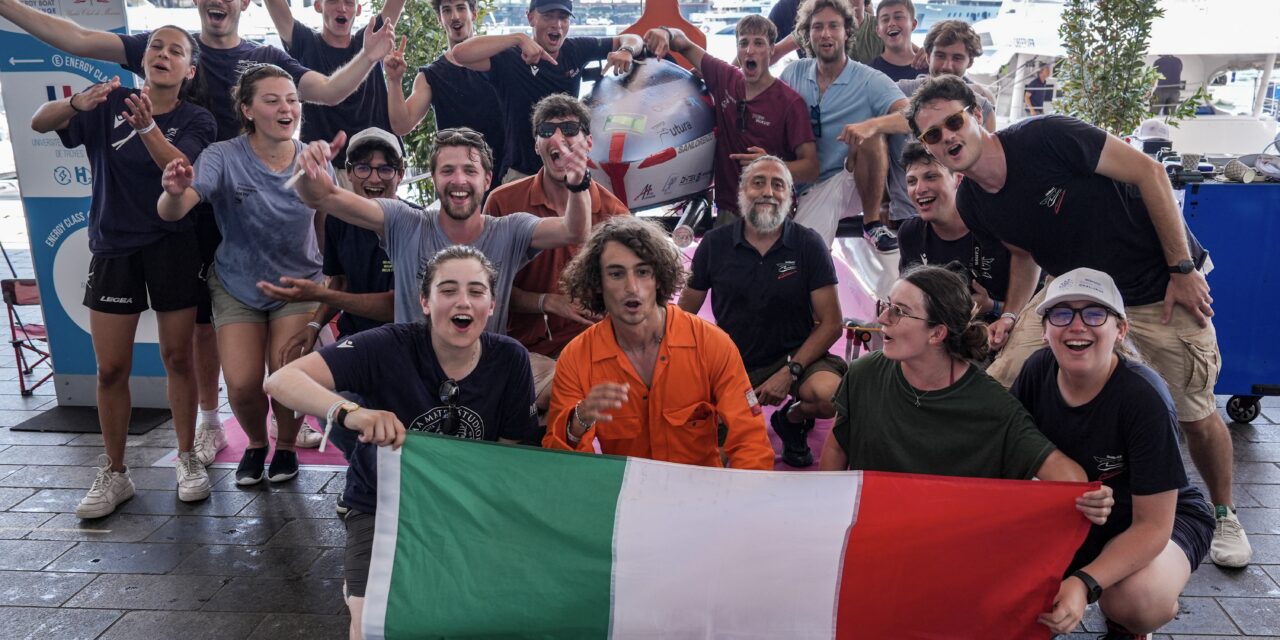The waters of Monaco turned into a proving ground for the future of clean marine technology as the 12th Monaco Energy Boat Challenge came to a close. After four days of intense racing, engineering prowess and innovation, the University of Bologna’s UniBoAT team emerged as the undisputed champion. Backed by Italian yacht builder Sanlorenzo, the Argonauts from Bologna not only clinched the overall title, but also won the Energy Class for a record fourth time, adding 2025 to their previous victories in 2021, 2022 and 2023.
This year’s competition brought together 42 teams from 29 universities across 20 countries, making it the event’s most international edition yet. Over 1,000 students gathered in Monaco, transforming the Yacht Club’s harbour into a global laboratory for sustainable marine propulsion. From India to Indonesia and Croatia to Qatar, young innovators unveiled designs that are already reshaping the future of boating.
UniBoAT’s winning vessel, Futura, swept the board: first place in slalom and endurance, a tie in the speed race with fellow Italians from the University of Genoa, and top honours for both Innovation and Design. They even set a new Energy Class speed record, hitting 26.63 knots. The team’s edge lay in a holistic approach to performance — from a counter-rotating traction engine developed in-house to a lightweight structure and an obsessive focus on energy efficiency. With around 30 students covering everything from powertrain engineering to marketing and aerodynamics, UniBoAT’s success was as much about collaboration as it was about cutting-edge tech.
Their pilot, Massimiliano Scalzulli, summed up the mood: “We won every race today so I’m very happy with the result and we look forward to the next competition in Olbia.” Fellow teammate Tecla Costa added that the win was especially sweet after the setbacks of last year’s hydrogen-related issues.
The University of Genoa’s Elettra UniGe team claimed second place, impressing judges with a high-efficiency catamaran featuring a 32 kW motor, 3D-printed propellers and an L-drive propulsion system. Third place went to Croatia’s Adria Racing, whose modular, carbon-Kevlar catamaran integrated a 20 kW electric motor and real-time satellite telemetry for live performance monitoring.
New to the challenge this year was the AI Class for autonomous vessels, taken home by the University of Antwerp’s Solar Boat Team. Their boat, guided by an artificial intelligence system capable of real-time visual analysis and autonomous decision-making, was a standout in a field that showcased the increasing convergence of marine tech with advanced computing.
Three trends defined the 2025 edition: the maturity of hydrogen fuel technologies, rising integration of AI for energy management and navigation, and the development of toroidal propellers aimed at reducing underwater noise pollution. Meanwhile, Frauscher Boats set a blistering pace in the Open Sea Class with a record-breaking speed of 49.84 knots.
The challenge also included the €25,000 Prince Albert II of Monaco Foundation Sustainable Yachting Technology Award, which went to none other than the University of Bologna — recognition for tangible environmental impact.
Off the water, two major conferences ran in parallel, tackling the sector’s transition to low-emission energy. The Yacht Club de Monaco also used the event to announce new partnerships under its SEA Index programme: one with AtmoSud to monitor PM and NOx emissions from yachts, and another with Bureau Veritas to roll out voluntary standards for assessing underwater noise.
For Yacht Club de Monaco General Secretary Bernard d’Alessandri, this year’s edition sent a clear message: “It’s impossible to find so many young engineers working for the sustainability of the yachting industry in the same place at the same time. Monaco remains the capital of advanced yachting.”
With student-led innovation racing ahead and industry engagement deepening, the Monaco Energy Boat Challenge is no longer just a glimpse into the future — it’s where that future is being built.

